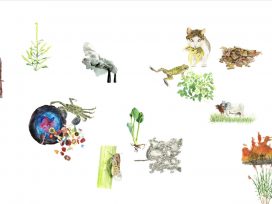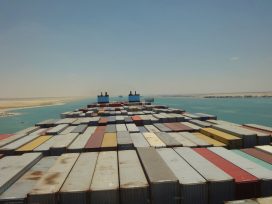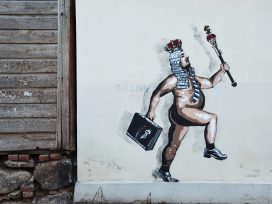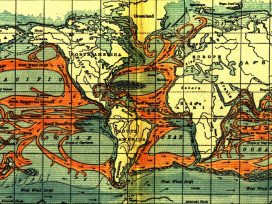For the first time in its history, Western Europe is ruled by a generation of people who, before the Kosovo crisis, have never gone to war. This historical fact is absolutely essential to understanding the problems of our identity. For centuries, this continent has been configured on the basis of confrontation between peoples, religions or races. The ‘right to be different’ has usually been vindicated with more force than the right to be equal, even in times in which the latter was the most visible revolutionary banner. Today most Western Europeans are peaceful people.
Yet, many of them are engaged in a number of cultural struggles. The expression of this right to be different is usually shaped around a culture which, too often, has been identified only with a certain language. This also explains why newspapers have normally constituted one of the most chauvinistic and nationalistic elements of every European society.
The media have thus often become expressions of the self-identification and, I would even say, self-satisfaction, of the societies in which they are born. The institutionalisation of the press and its often reverential attitude to the powers that be have caused it to constitute itself into a system of representation of national interest.
I remember when the French Minister of the Interior went to General De Gaulle’s office to denounce the attitude of the elderly philosopher Jean-Paul Sartre, then involved in a public agitation in favour of the most radical causes. He suggested the convenience of arresting him, however painful and scandalous that may be. The general soon ended the conversation: ‘Monsieur Sartre est aussi la France,’ he replied in an imperative tone of voice, thus justifying not only the protection enjoyed by the intellectual, but also the criterion on the basis of which he deserved it: la France.
Newspaper editors suffer from an unstoppable tendency to emulate the author of Being and Nothingness , and to imagine that their titles belong to the cultural, intellectual and political baggage of the societies in which they are published. Nobody doubts that The Times – in spite of its recent trends towards a more popular than quality paper – continues to see itself as a symbol of England, like Le Monde in France – as much as or even more than the person of Jean-Paul Sartre – or Frankfurter Allgemeine Zeitung in Germany.
Meanwhile, it is very difficult to find dailies or weeklies that openly express a sense of European identity. The only paper which could aspire to do so with any chance of success, because of its global vocation, is, paradoxically an American paper: the International Herald Tribune ; published in English, naturally enough.
Lingua Franca
Allow me to speak about language for a moment; that is, about the existence or not of a lingua franca on our continent. The identification of a European culture as such only began with Romanisation, thanks to the massive extension of Latin as the universal language of culture. The Holy Empire was able to reinforce this linguistic identity with the much more powerful force of religious conviction. And it is this kind of fantasy, sometimes made real by the spilling of more than a little blood, that has kept us alive practically until the present.
History shows that languages are created by people but imposed by empires. Arnold Toynbee has already pointed out the fact that while in the Old Testament the proliferation of languages is shown as a torment and a divine punishment against the arrogant architects of the Tower of Babel, the first gift given to the apostles at Pentecost was the gift of tongues. The plurality of languages is still considered today to be an important part of our cultural and historical richness.
The most extreme facet of this belief is the fact that some languages, such as Gaelic and Basque, receive considerable amounts in public aid and subsidies to defend themselves against the invasion of the dominant languages of their respective states. However, plurality of idioms is still an obstacle in the creation of a mass media that could bring us closer to a unitary consciousness of Europe.
Almost since the dawn of time, language, weapons and money have been the most powerful means of communication and socialisation created by human ingenuity. In recent Europe, practically until the creation of the Euro, this tripod stood on American legs. If English is now lingua franca of our continent, it is because of the worldwide globalisation process, stimulated by the United States of America.
The Euro Medium
The European army par excellence, NATO, is under the orders of an American general. And up until very recently, the dollar was the monetary standard most heeded by the economies of Western Europe. We cannot contemplate this phenomenon as a failure, but merely as a sign of the times. But we can take a lesson, too, from the exciting fact of the creation of the Euro. This is, indeed, for the very first time, an actual and powerful European media of communication, and will contribute to the invention and foundation of others.
The cultural unity of Europe is as evident from outside the continent as it is debatable and confused from inside, even up to the point that many think that America is only a kind of Europe gone adrift.
Our insistence on the diversity of our peoples cannot hinder the tendency to unify ways and customs, from fashion to food, from movies to travel. We cannot take every step in this process as a loss or an alienation. The question is to know how the media, whether multilingual or not, may contribute to the construction of Europe, not only as a confederation of interests but also as a conjunction of feelings.
Recent experiences regarding the attempts to build a European paper medium – either a magazine or a shared supplement of various dailies – are not optimistic. The failure of The European is sad, but not as sad as the unfortunate, boring existence of the bureaucratically protected Euronews TV channel, which has managed to bore the public in half a dozen languages.
But the illusion of difference, of the diversity of local or regional publications, serving minority or partial identities, is – at the same time – being demolished by the concentration of businesses in the media section. So, the fragmentation of the media does not necessarily mean plurality. The two main magazine groups working in Spain are French and German respectively. The leading economic daily in Paris is owned by Pearson, as it is in Madrid. The most avidly chauvinistic media are protected and sponsored by multinational conglomerates, which are often obedient or not combative enough regarding the excesses of local or national powers. Government interests have no better ally than the supposedly neutral or apolitical attitudes of foreign-owned newspapers, radio or television channels.
Digital Domination
Beyond the print and audio-visual media, the likely evolution of the so-called global information society, with digital processes and the advance of the Internet and other networks, will completely transform our current communicational habits.
In the digital society, the supremacy of English is absolute. Nicholas Negroponte, the guru par excellence of the cybernetic word, forecasts that in the future, a functional command of the English language will be indispensable to be able to manage on the Net: to surf, to be interactive, to be informed and to inform others, to buy and sell, to learn and teach. He compares it to the needs of pilots and air-traffic controllers, who use English as their work language, although in the cockpit they speak among themselves in their other tongue. Again: it seems obvious that the expansion of English as a lingua franca is inevitable, not just in Europe but worldwide.
Inevitably, this will affect the sensibilities and feelings of the identity of Europeans. However, the language with the most speakers in Europe is German. The conclusion is that most European citizens aiming to fulfil all rights and duties will need, usually, to speak at least two tongues and, in many cases, three.
In short, cultural diversity is an intrinsic part of European unitary identity. It is what Edgar Morin defined as Unitas multiplex in his book Penser l’Europe . This plurality will be enhanced, and confused, by the increasing number of immigrants belonging to different ethnic groups, religions and cultures.
The media have the role and responsibility of promoting the understanding between these people and national residents in a world where racism, xenophobia and even fascism is growing under the flag of nationalism.
Paradoxically enough, all this diversity tends to become uniform because of the abrasive extension of English (not only as the language of business and politics, but also as that of communications and media), and because of the powerful processes of business concentration in the media section.
Just a few years from now, less than a dozen companies will be able to control the majority of the contents of communications in the European continent. These groups will be British, German, French and, maybe, Italian. Smaller, but more advanced countries, such as Holland, may be able to defend themselves in this territory. But many of the so-called national cultures and local identities will submit their balance sheet to foreign boards of directors.
I am not criticising the phenomenon, merely describing it. On the other hand, this will be the only way of protecting ourselves (if we want to be protected) against the American invasion. The plurality of Europe, its multiplicity and diversity, which we all praise and promote, will finally be left in very few, and quite uniform, hands. One more of the many paradoxes with which we will have to live in the coming century.
As the French writer Sami Nair has pointed out, ‘Western civilisation has become global and thus cultures are local… unifying divides; trying to include everybody expels any individual; globalisation comes back to nationalisms…’ This is the new European culture that the media have to deal with.






